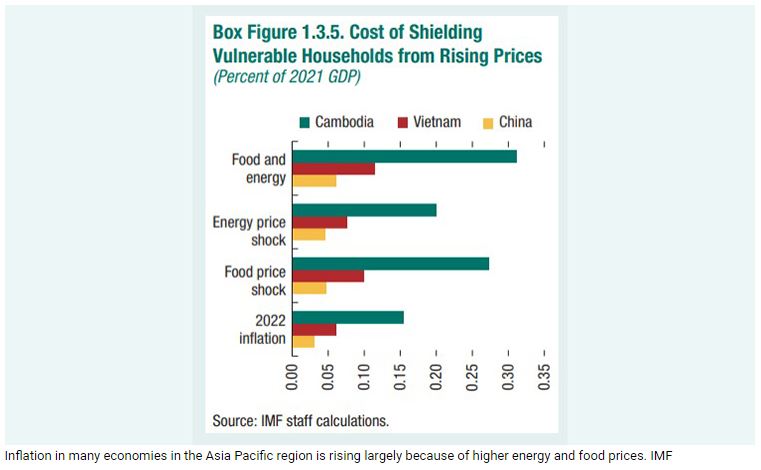Cambodia: Rising prices to hit low-income families hard: IMF
Increasing food and energy price inflation is likely to have a significant impact on families in low-income countries and emerging markets in the Asia Pacific region, according to IMF.
The share of families living below half of the annual income per capita may increase up to one percentage point in some countries, said IMF in its outlook for Asia and the Pacific, released in Singapore recently.
Although some governments have taken fiscal measures to support the vulnerable sections of the population, this might not be enough to offset the substantial loss in income because of high inflation. Higher inflation could translate into proportional fiscal costs if governments decide to support vulnerable families for income losses because of inflation.
For example, compensating all vulnerable households under the baseline projections would cost 0.15 percent of the gross domestic product (GDP) in Cambodia, 0.06 percent in Vietnam, and 0.03 percent in China, said the IMF in its Regional Economic Outlook for Asia and Pacific.
As in most of the world, inflation in many economies in the Asia and Pacific region is rising largely because of higher energy and food prices. This is a concern for many families because food and energy constitute the largest item in their consumption baskets (about 52 percent and up to 61 percent including transportation), especially for poorer households in lower-income countries, says the IMF outlook.
Households in the lowest consumption segment in low-income countries are the most vulnerable to food and energy price fluctuations, with about 59 percent of their income spent in food and another 10 percent for energy and transportation.
By contrast, the richest household group in the Asian emerging market and developing economies spend less on food (16 percent) and energy (2 percent) and more on transportation (21 percent).
Higher inflation will erode real income and push more households below the poverty line. Results based on household surveys for selected Asian emerging markets and developing economies and on July 2022 World Economic Outlook Update inflation projections suggest that relative poverty may increase by about 1 percentage point in Cambodia and Vietnam and about 0.2 percentage point in China.

Differences across countries reflect higher inflation forecasts in Cambodia and Vietnam, and the different shapes of income distributions, since the greater the number of households clustering just above the relative poverty threshold, the larger the changes in poverty shares.
These effects would almost double in a situation when the rise in energy and food prices is assumed to be twice as large as in the baseline, and are likely to be even larger for households in many Asia low-income countries, where people’s exposure to changes in the prices of these goods is more substantial.
The rise in food and energy price would also lead to persistent increases in consumption inequality unless policies succeed in altering historical patterns, the IMF said.
These effects vary across countries and are larger in emerging markets and developing economies, in which food and energy represent a larger share of the consumption basket.
“Asia’s strong economic rebound early this year is losing momentum, with a weaker-than-expected second quarter. We have cut growth forecasts for Asia and the Pacific to 4 percent this year and 4.3 percent next year—down by 0.9 and 0.8 percentage points, respectively, compared to the April World Economic Outlook—which is well below the 5.5 percent average over the last two decades. Despite this, Asia remains a relatively bright spot in an increasingly dimming global economy,” noted Krishna Srinivasan, Director of the IMF’s Asia and Pacific Department.
Source: https://www.khmertimeskh.com/501177680/rising-prices-to-hit-low-income-families-hard-imf/


 Thailand
Thailand




